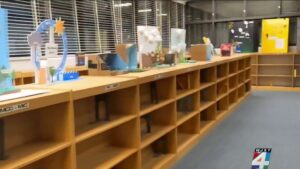
Photo courtesy: WJXT News4JAX
An ongoing series of restrictions placed on public education in Florida over the past year
have begun making their way into Leon County’s public schools, and some local teachers
have been struggling to adapt to a rapidly changing classroom environment.
These restrictions began with House Bill 1467, signed by Governor Ron DeSantis in
March 2022, which required that school districts make public records of the reading
material used in classrooms while also allowing parents to make objections to any
educational material that they deem inappropriate. This was followed by the signing of
House Bill 7 the following month, which targeted the teaching of critical race theory in
public schools. Both bills took effect on July 1, 2022.
A student at Florida A&M who is a fifth-year elementary education major witnessed the
impact of these bills firsthand while working full-time in schools throughout 2022, and
the sweeping changes have left them feeling skeptical and scared.
“Teachers – especially Black ones – had to censor how they presented history to
students in a way that was honest but still coincided with new regulations and laws”
the student, who requested that their name not be used, said. “It was really difficult to
do, and a lot of teachers felt almost ashamed.”
To them, ensuring an honest education that allows for creative expression and
accessibility to all cultures is of paramount importance.
“I’m scared for the little ones, that they’re being used as pawns in a bigger game and
that the Legislature doesn’t truly care about their education.”
A Tallahassee middle school librarian and educator with several years of teaching
experience – who sought anonymity – briefly left the field in the first half of 2022 and
has recently returned to what they described as a completely changed climate in the
classroom and beyond.
“Staff is very uneasy about the changes as they mean further complications in the
classrooms,” they said. “Educators are also scared as we have the threat of a Class 3
felony hanging over our heads should we have any unsanctioned materials in our rooms.
We do not have a list of what we can allow in our rooms yet, so they will have to happen
fast when the changes officially occur.”
Though county-wide changes regarding banned books have not been enacted
throughout Leon County Schools, some teachers are preparing for the worst by making
their entire classroom libraries inaccessible to avoid the logistical nightmare of sorting
through thousands of books and awaiting their approval.
A local early elementary school teacher – who also requested to remain anonymous –
never expected to have to resort to such measures, but they felt that they had been left
with no choice.
“It’s sad for the kids because they don’t have books in the classroom, but I also think
they’re taking away our professionalism as an educator to be able to choose the right
kind of books to share with our kids.”
Throughout a career spanning over two decades, the teacher has never witnessed such
a crusade against public education.
“The state of education is in dire straits, and I think the government is trying to do away
with public schools,” they said. “I could walk away, but the problem is – like a lot of
people – I love what I do. If I could do what I wanted to do and not feel scrutinized and
under a microscope all the time, it would be a lot easier.”
The middle school teacher echoed this sentiment, also claiming that amid an increasing
number of failing students, the lawmakers are the ones failing them.
“It feels like public schools are being cut down and choked until the only alternatives left
are the private and charter schools that make already rich people more money. We are
seeing historically low reading levels, but instead of focusing on how we can support
these students, we are taking away precious resources and making every day in the
classroom more difficult.”
Now working as a librarian, they have been at the front lines watching their school
library devolve with the introduction of new policies that have made their job as a
media specialist “feel hopeless and crushing.”
“I came back because I want to work in a library, but instead of safe and quiet learning
spaces where children can explore new stories, they are becoming a place to house
standardized testing and faculty meetings.”
These three instructors come from varying backgrounds with varying experiences and
beliefs, yet they share a common goal: To provide the best possible education for their
students. To do so, they stand firm in what they believe is the necessity of literacy and
accessibility to many cultures and perspectives that books can offer to young children.
As Gov. DeSantis and state legislators push for greater control over what can be shared
in a classroom, teachers like these say they will continue pushing back.